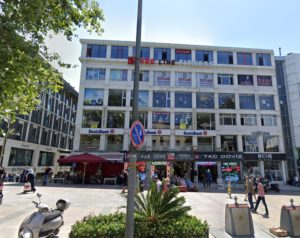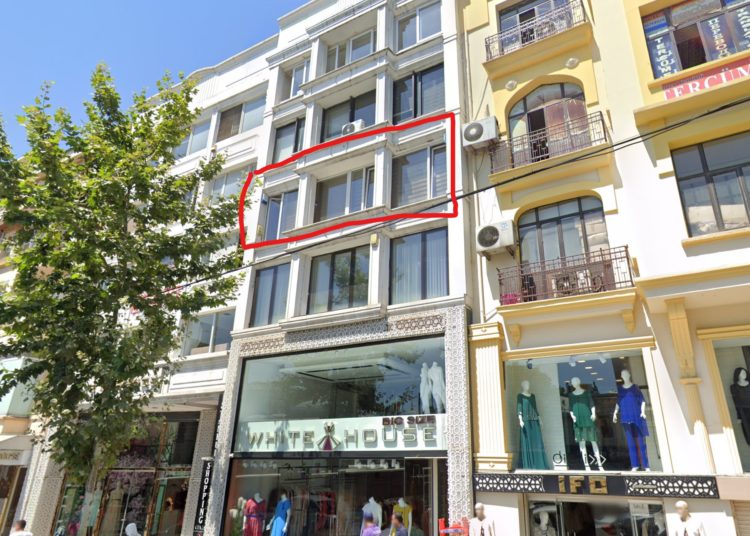Abdullah Bozkurt/Stockholm
A Turkish company set up by Hamas operatives to funnel funds from the Islamic Revolutionary Guard Corps-Quds Force (IRGC-QF) and Hezbollah to the Qassam Brigades dissolved itself after it was designated by the US Treasury as a sponsor of terrorism, a Nordic Monitor investigation has found out.
Redin Danışmanlık İç Ve Dış Ticaret Limited Şirketi, a consulting and foreign trade firm identified as Redin Exchange by the US, was sanctioned by the US Treasury on September 10, 2019 for transferring money to Hamas for terrorist acts. The company’s owners rushed to liquidate after the designation and decided to dissolve it 10 days later at a board meeting.
The decision was notarized on September 30, and the official petition to dissolve the company was approved by authorities on October 4, 2020.
Redin’s trade registry filing when it was established in 2014 as a front company:
According to the US government, the firm has “materially assisted, sponsored, or provided financial, material, or technological support for, or goods or services to, HAMAS.” Some examples of this backing include a transfer of $10 million in March 2019 to Hamas’s operational arm, the Izz-Al-Din Al-Qassam Brigades, also involving Treasury-designated financial facilitator Muhammad Sarur.
Redin’s footprints were seen throughout 2017 on several occasions while transferring tens of millions of dollars to Hamas, according to the Treasury release. In July 2018 Redin Exchange paved the way for the delivery of $4 million, which Iran’s Quds Force sent to Hamas. Redin was also responsible for sending $2 million from the Quds Force to Hezbollah and Hamas in May 2018. In July 2017 the company was the intermediary for a transfer of $5.5 million from a senior Hamas leader to Hamas finance chief Zaher Jabarin, who is based in Turkey and was one of the persons added to the list.
Turkish trade registry records show that the company was first established on June 9, 2014 in Istanbul’s conservative district of Fatih under the name of Dirin, which was changed to Redin four days later. Two Iraqi nationals listed as Marwan M Salih Salih (Marwan Mahdi Salah Al-Rawi in the US Treasury announcement) from Anbar province and Ismael Salman Mosleh Mosleh (aka Ismail Tash as identified by the US Treasury) from Baghdad were listed as co-founders. Its business was described as ranging from financial services to trade in goods and services both in Turkey and abroad. Its paid-in capital was 160,000 Turkish lira ($75,000).
Trade registry filing shows Redin took on new partners in 2015:
In February 2015 the company moved its offices to the busy Ordu street in in the same district. On February 20, 2015 Mosleh transferred half his shares to another Iraqi national, Ali Abdulkareem Abduljaleel Abduljaleel, while Salih did the same with Iraqi citizen Usaab Abdullah Jubair Al-Ahmed. As a result, four Iraqi citizens became shareholders in Redin. On December 12, 2017 Abduljaleel returned his shares to Mosleh and left the company. A year later, Mosleh turned over all his shares to Salih and exited. In April 2018 only Salih remained as the holder of all shares in Redin after Al-Ahmed transferred his shares to him.
The frequent changes in shareholders suggests Redin was a shell company and that operatives bought and sold shares to maintain their residency in Turkey or to fulfill specific assignments for a limited time. By the time the US Treasury designated the firm, only Salih was listed as owner of the company. It had operated five years in a neighborhood crowded with foreign tourists, while Turkish authorities looked the other way.
Redin was liquidated by its partners in Turkey after the US Treasury designation:
A search of trade data on shareholders’ ID numbers provided to foreign investors in Turkey did not show any other company in which these individuals were involved except Mosleh, who owned Smart İthalat İhracat Diş Ticaret Limited Şirketi, a foreign trade company. It was interesting, however, to see that Mosleh presented a Sudanese ID number and address in Khartoum in filing trade registration papers. As a co-founder of Redin, he presented an Iraqi ID number and an address in Baghdad. However, both companies’ address in the Fatih district was the same. Smart was also designated by the US Treasury. Its capital was 1 million Turkish lira ($281,000) when it was established on May 25, 2017.

Smart is still in business as of today at a different address, across the street from Redin’s office, and a new caretaker was brought into the company on December 3, 2019. A Turkish national named Demir Salmanoğlu, who maintains a residence in Khartoum, replaced Mosleh. It is likely that Hamas and the Quds Force set up new shell companies under new names after Redin was liquidated.
Smart’s trade registry filing in 2017:
It’s not surprising that the IRGC Quds Force was emboldened and ran financing operations to Hamas through Turkey when the government of Recep Tayyip Erdoğan hushed up a confidential criminal probe into Quds Force operatives and entities in February 2014. The investigation, launched in 2010, was looking into firms, associations and entities that were linked to the Quds Force. Some senior government officials including two chief advisors to Erdoğan were listed as suspects in the investigation.
Smart’s updated records showed a Turkish national from Sudan replaced Mosleh:
The investigation was abruptly thwarted before the prosecutor had a chance to file his indictment, and the government punished the tax auditors, police chiefs and prosecutors who took part in the Quds Force probe. All were dismissed and/or jailed, sending a message of impunity to Quds Force operatives in Turkey.
The Erdoğan government also balked at US requests to crack down on the Hamas network in Turkey and refused to designate the organization as a terrorist entity. Even the Quds Force’s Turkish network, Tevhid Selam, designated as a terrorist entity in decisions by the Supreme Court of Appeals, did not face any crackdown, and the government continued to welcome Tevhid Selam operatives.
According to the US Treasury, Redin was also involved in the transfer of funds to the Islamic State in Iraq and Syria (ISIS). In late January 2018 OFAC-designated ISIS financial facilitator Walid Talib Zughayr al-Rawi was aware of an approximately $500,000 financial transaction of Redin’s Salih, the Treasury said.












